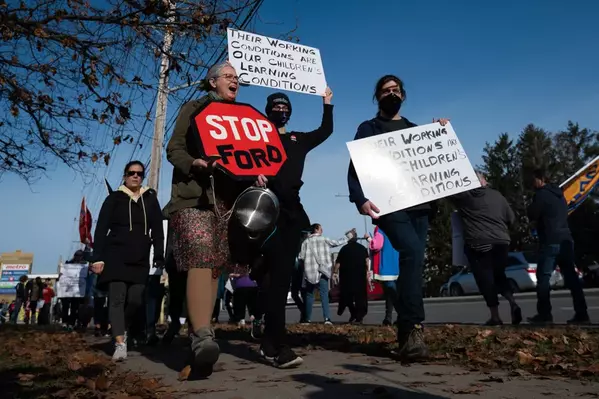The Ontario education workers strike is a foreshadowing of further attacks on workers' and other rights if the Ford and other Canadian governments is allowed to get away with it. Please support them by signing below, whether you live in Ontario or not.
Ontario’s education workers are coming together with unions, parents, students, health care workers and other allies — from Ontario and across the country — to defy the Ford government’s anti-democratic, anti-worker, strikebreaking legislation. Premier Doug Ford’s attack on workers’ rights in Ontario is an attack on workers’ rights everywhere. We know you don’t live in Ontario, but we thought you might be interested in signing our solidarity statement and showing support for Ontario’s education workers.
URGENT: in an unprecedented attack on democracy, Premier Doug Ford and Education Minister Stephen Lecce invoked the notwithstanding clause to force unionized education workers back to work — for exercising their charter-protected rights to strike.[1]
The right to strike, to withhold labour, is crucial to healthy democracies. But we know from the past four years the Ford government has little regard for workers and democracy. [2-4] Instead of sitting at the bargaining table and negotiating in good faith, Ford and Lecce are resorting to bullying tactics — and we can't let them get away with it. [5]
They're trying to pit parents against education workers by spreading false narratives about disruption of the school year. [6] But Gerald, we can't let him divide us. We have to show them that the majority of parents and the public stand with education workers and support their right to bargain for better working conditions — and their right to job action should bargaining fall through.
They have forced the strike-breaking legislation through. But they've underestimated public backlash — and the collective power is building. A massive petition, signed by tens of thousands of us, will show CUPE they're not alone in this fight, and it could help counter Ford and Lecce's efforts to divide parents and education workers. Gerald, if you believe Ford and Lecce should drop their bullying tactics and return to the bargaining table in good faith, will you add your name to the solidarity statement?
Ontario's lowest-paid education workers are surviving off of $39,000 a year. With the spiralling cost of living, this isn't anywhere near enough to make ends meet. They're asking for a survivable wage increase. It's not a huge ask, especially considering the Ford government just gave 43 of its own MPPs a $16,000 raise, on top of their already six-figure salaries. [7]
CUPE was still at the bargaining table, but the Ford government walked away — instead, they introduced strikebreaking legislation that is against the Charter of Rights and Freedoms to force education workers to work for precarious poverty wages and poor working conditions. [8]
They've done this before with Bill 124 — capping nurses' wages and forcing nurses to work in poor conditions. [9] It's why there's a huge nursing shortage in Ontario. They're intentionally doing the same thing with education workers. By underfunding public systems, they allow privatization to swoop in.
But CUPE's fighting back and thousands have taken to the streets and picket lines. [10] They are refusing to succumb to Ford's and Lecce's bullying tactics and will continue to exercise their charter-protected right to job action. [11] We can't let them pick us off one by one and isolate public sector workers.
If you support education workers' charter-protected rights to bargain and strike, will you sign the solidarity statement?




